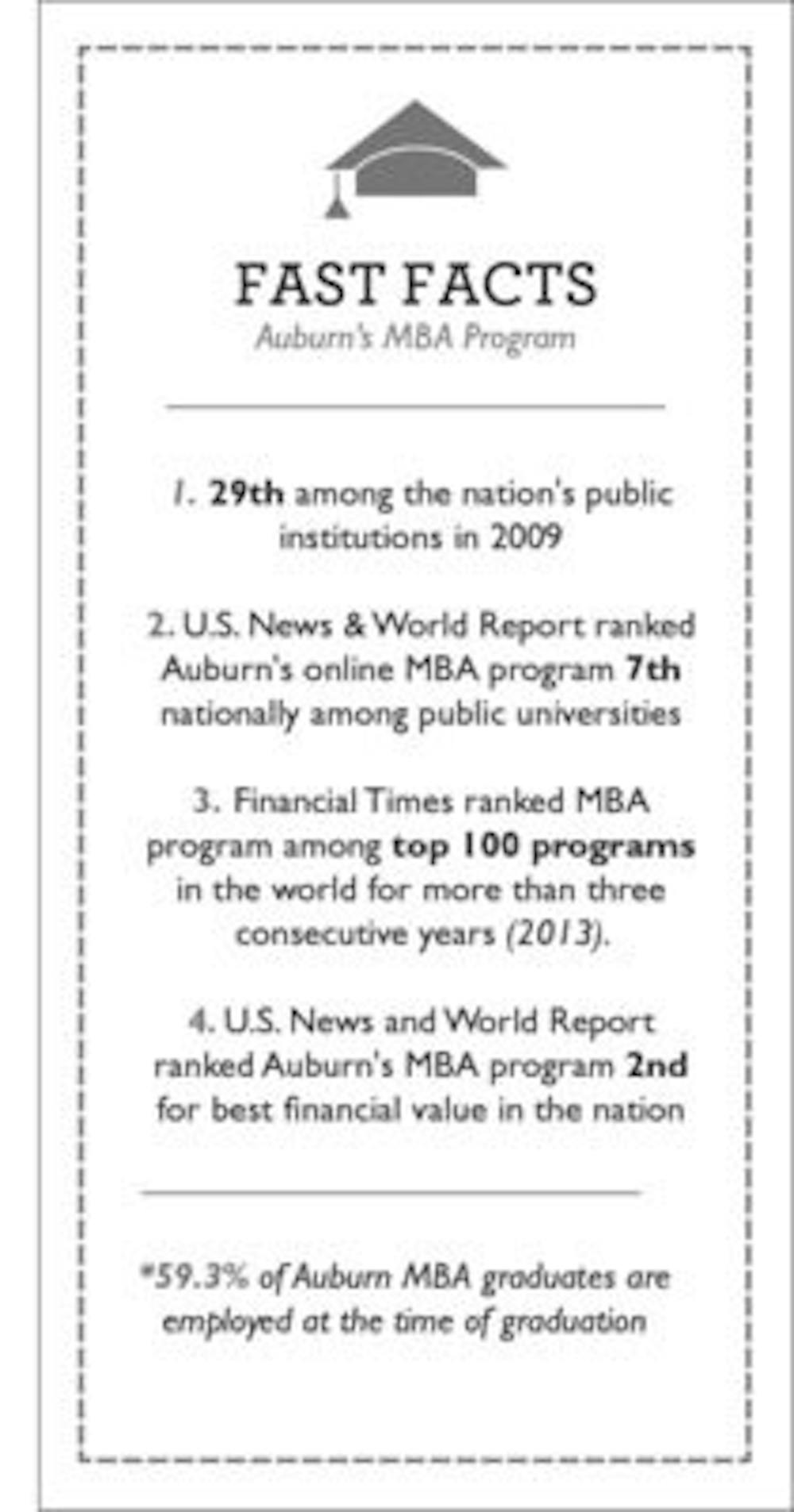Auburn's MBA program knows how to get down to business.
In its most recent rankings, the graduate program at the Raymond J. Harbert College of Business placed second in the nation for "Best Financial Value" by U.S. News and World Report.
The esteemed survey revealed Auburn MBA graduates had the second highest salary-to-debt ratio in the nation, with a score of 6.72.
In other words, an MBA graduate from Auburn makes a starting salary 6.72 times greater than their average debt.
"Our mission statement says that we are dedicated to producing highly desired graduates," said Bill Hardgrave, dean of the College of Business. "We're purposely doing things to make the students more attractive for the industry, which pushes up the salaries of our graduates."
Even in hard economic times, Auburn's business school has been successful in keeping its cost in check, and, most importantly, maintaining its value.
"Our students are deciding to spend a year and a half where they're not working, so that's a huge investment of time and money on their part," said Stan Harris, associate dean for graduate and international programs. "We want them to feel like the time they've taken to do this program is ultimately worth it. The investment is more than just money."
According to data collected by U.S. News, the average Auburn MBA graduate earns an average starting salary of $57,169 while having an average debt of $8,500.
The average graduate school debt totals more than $30,000, which is thousands above Auburn graduate's debt.
To keep that number low and the salary-to-debt ratio high, the Harbert College of Business offers a generous number of graduate research assistantships.
In the fall of 2013, 26 of 28 entering MBA students had an assistantship, or were paid a salary to attend Auburn while they worked for faculty.
"The student gets money, the faculty gets help, and the student gets hands-on learning and work experience," Harris said. "It's a win-win for the faculty and the student."
While assistantships provide opportunities, the last thing they provide is free money.
On an assistantship, students work an average of 14 hours per week to give back to the College of Business on top of their regular coursework.
Even so, finances aren't the only things that make a program valuable.
"Great programs start with great students and great faculty," Hardgrave said. "I'm not trying to over simplify it, but it really is that simple. If you have great students and great faculty you will have a great program. I would put our students and our faculty up against any in the country."
Accomplished MBA student Lauren Little, graduate student in business administration, feels the U.S. News ranking is justified, but not just for the low price she's paying.
"I'm learning a lot and I feel like what I'm learning is really helpful and applicable to the career I want," Little said. "Auburn professors seem to be very experienced and have a lot of knowledge of the business world."
Little said she agrees it is rare to find administrators who care as much as hers do.
"I know it's very cliche, but in this program you definitely feel the sense of the 'Auburn Family,'" Little said. "From the administrative staff to the professors and students in the program, you have a feeling that everyone is really supporting you and doing everything they can to help you succeed."
In the fall, Auburn's MBA program helped Little be nominated for the prestigious Mitchell Scholarship.
"We use assistantships as recruiting tools to recruit the best and brightest students," said Jim Parrish, director of MBA Admissions and Operations. "If a student has a strong background and test scores and they fit the 'Auburn brand,' then we want them in our cohort."
Parrish said Auburn's MBA program has great students, faculty and financial cost, but what makes it truly valuable is up to personal opinion.
"I think a huge asset of our program is that any student would benefit from the people that are working in it," Parrish said. "From the folks who do the academic advising to our professors and faculty, they all have a unified front to help Auburn students succeed. Taking care of people on an individual basis is the Auburn way. The personalized approach to our MBA program is the thing that really sets Auburn apart."
Do you like this story? The Plainsman doesn't accept money from tuition or student fees, and we don't charge a subscription fee. But you can donate to support The Plainsman.





